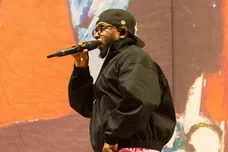The debut album is a rite of passage. An introduction to the world, it’s not uncommon to see fans deify the debut, setting the standard to which subsequent projects are held. The sophomore album holds equal import. It’s often held in direct comparison to the debut and thus the center of many lively discussions; was it a fluke or is the artist in question truly worth watching? For newer artists, the prospect of a third album --let alone a seventh-- is difficult to imagine. To achieve such longevity is the dream or at least it should be. Considering today’s breakneck pace at which albums arrive, it’s entirely possible that artists will simply burn out. Or worse, the fans will.
In a game where longevity is the goal, there’s an inherent significance surrounding the seventh album. Perhaps it’s imagined, a symptom of the number’s signature “luck.” Not many can say they’ve released seven studio albums. Such benchmarks remain a veteran's honor. To achieve to the highest degree, patience, renewed inspiration, and a habitual work ethic must co-exist. While life on the road is essential for a breaking act, an established artist can get away with biding their time. Newfound doors open up as the transition to OG status manifests. Love and family become viable themes. Reflections are enhanced through the lens of hindsight as old stories gain new perspectives. We once heard Jay-Z utter the rhetorical question “What More Can I Say?” on his eighth studio release The Black Album. Fourteen years later, 4:44 brought new insights into the Jigga Man’s life. The story never stops writing itself provided the author still has the drive to share it.
Dave Kotinsky/Getty Images
On the topic of Jay, what was his seventh solo project? That would be Blueprint 2: The Gift & The Curse. The prolific Jay managed to ride an album-a-year pace until his “retirement” in 2003, but Blueprint 2 brought upon a first for the New York legend. It was the first double album of his career. Not to mention, a major sonic deviation from its predecessor; musically, it rang closer to previous drops like Hard Knock Life & The Life And Times Of Sean Carter. At the time of its release, Jay was 33 years old, having recently embarked upon a romantic journey with Beyonce. Aside from serving as an introduction to the couple, “03 Bonnie & Clyde” revealed a newfound element of Jay’s character, that of the smitten. Many of the album's innovations came on the musical end, with experimental production on tracks like “Guns & Roses,” “N***a Please,” and his Dr. Dre-laced banger “The Watcher 2.” It’s fair to say that Jay was forging new ground on his seventh go-around, and many hold Blueprint 2 in high esteem to this day.
Out west, a fellow veteran found himself getting ready to drop his seventh album. The year was 2004, and Snoop Dogg was at a crossroads. Already boasting deals with Death Row and No Limit on his extensive resume, the Doggfather ultimately found himself in Pharrell & Chad Hugo’s inner Star Trak circle, picking up where 2003’s “Beautiful” and “From Da Chuuuuch To The Palace” left off. Though Snoop had never been one for concision, it's fair to assess that album seven R&G (Rhythm & Gangsta) might have suffered from a lack of focus. True, Snoop managed to turn in one of his biggest hits in the infectious “Drop It Like It’s Hot,” proving that his commercial appeal remained magnetic. Yet at times, it felt as if the Doggfather was simply going through the motions, abandoning his signature qualities in favor of a breezy synth-tinged sound. Without hearing directly from Snoop, one has to wonder if R&G was the product of sated enjoyment, of expending creative energy with The Neptunes and friends. Yet in spite of its occasional repetition and listless production, R&G remains an enjoyable listen even with Uncle Snoop sitting comfortably in cruise control.
It’s not often that the darkest depth of one’s character comes to the forefront on the seventh go-around. And yet with Kansas City’s Tech N9ne, that’s exactly what happened. Having already established himself as a friend of the macabre, Tech surprised fans with 2009’s KOD, his seventh solo studio release (excluding his Collabos series, which if counted would make KOD his ninth). Unfortunately, the acclaimed project was the product of misfortune. Affected by his mother’s deteriorating health, Tech’s frustration and anger spilled onto the page, culminating in the rapper’s most violent, disturbing, and brutally honest album yet. Songs like “In The Trunk” and “Pinocchio” reveal Tech’s penchant for the horrific, yet the finest works of horror are often anchored by heart. KOD lays N9na bare, with his fears and insecurities manifesting through grisly visions of the reaper. On “Low,” Tech picks up where previous songs like “Suicide Letters” left off, dueling with depression in the face of commercial prosperity. Though it’s likely this album came from a place of pain, Tech’s unflinching vision connected deeply with his loyal fans, who still name KOD as one of his crowning achievements to date.
Dave Kotinsky/Getty Images
In the Dirty South circa 2010, Gucci Mane found himself making up for lost time after serving a ten-month prison stint. As is often the case for an artist looking toward their seventh studio drop, a change was in the air. Prior to releasing The Appeal: Georgia’s Most Wanted, Big Guwop officially ushered in 1017 Brick Squad Records, a testament to his newfound mental state. Yet unlike the aforementioned artists, Gucci was facing his own predicament; the dichotomy between his mixtape run and his studio output, with fan preference skewing heavily toward the former. Curiously enough, The Appeal barely dealt with Gucci’s harrowing experiences, opting to deliver more of his expected subject matter. Hardly a negative given his mastery of sauce navigation, but slightly diluted when served in the album format. It felt as if Gucci was employing his mixtape principles, which is to say a prolific nature and highly instinctual approach to songwriting, to the creation of The Appeal. What followed was a collection of songs that likely went off in situational settings, though did little in expanding on his overarching story. A story he would be happy to tell through his autobiography in 2017, though by that point his output would have doubled.
Coming full circle back to the Big Apple, it seems appropriate to highlight the man with the elite vernacular, Tony Starks himself. In 2007, Ghostface Killah came through with his seventh effort The Big Doe Rehab, lining the project with Wu affiliates and his signature brand of gutter absurdist comedy. Occasionally hampered by the reputation of Supreme Clientele, Ghost’s track record remains among the game’s most consistent, with Big Doe serving as another valued chapter in his discography. Still, it does occasionally feel like a retread of familiar ground, though Ghost’s approach remains invigorating enough to entertain. Like Snoop, it seems as if Starks prioritized keeping his own creative wheels spinning rather than trying to reinvent them altogether. Years down the line, Ghost would rediscover his adventurous spirit with conceptual efforts like 12 Reasons To Die, but Big Doe Rehab serves as a reminder that music doesn’t have to break barriers to be enjoyable.
To remain a mainstay in the greater cultural discourse, however, is another challenge altogether. In truth, it’s rare to see a rapper’s seventh album held in particularly high regard, raising an interesting conundrum. Artists are compelled to create and should not be expected to hang up the mic at the tail end of a lengthy career. Though hunger may fade and bouts of inspiration come and go, many rappers have continued to take solace in the booth. Perhaps that's why album seven can feel like retread territory, barring the arrival of an impactful inciting incident. Despite seldom occupying the coveted spot of "magnum opus," we should celebrate the milestone all the same. For the most part, merely getting to the seventh drop is an honor reserved for storied vets (and/or prolific newcomers). Consider that today's Big Three of Kendrick, Cole, and Drake, have yet to hit the milestone after nearly a decade deep in the game. What might they sound like when that Lucky Number rolls around?







